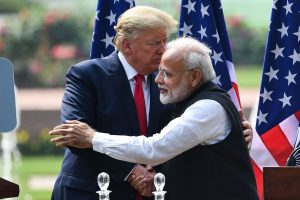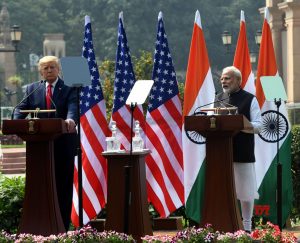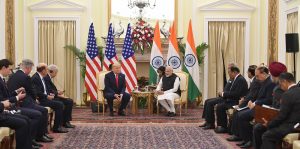
In a deft fusion of spectacle and substance, India hosted the largest ever public reception for a foreign leader as India and the US elevated their multi-faceted ties to the level of comprehensive global strategic partnership that will include enhancing security cooperation and proactive partnering in the Indo-Pacific to shape an inclusive and friction-free region.
The maiden visit of President Trump to India scored high on pageantry as he was accorded a spectacular welcome at the world’s largest cricket stadium, but it was also ambitious in outcomes and fleshing out contours of a tighter strategic connect between the world’s oldest and largest democracies.
Diplomacy acquired a strong personal flavour reflecting personalities of the two leaders as they lavished admiration and affection on each other, making personal chemistry central to the emerging new phase in the India-US relationship.
Encapsulating the expanding envelope of the India-US partnership, PM Modi said at a joint media appearance with President Trump: “In our discussion today, we have positively considered every important aspect of this partnership – be it defense and security, energy strategic partnership, technology cooperation, global connectivity, trade relations or people to people relations.”
Setting Stage for the Big Deal
The success of the visit lies in the adroit manner in which it moved the relationship beyond differences about a long-negotiated trade deal to a deeper strategic convergence and a shared global vision that is reflected in the new nomenclature: comprehensive global strategic partnership. The failure to negotiate the trade deal did not cast a shadow on the much-publicised visit; on the contrary, President Trump raised the bar by promising a bigger deal that will help fructify huge untapped economic potential between the two countries.
“As far as bilateral trade is concerned, there have been positive talks between our Commerce Ministers. President Trump and I have agreed today that the understanding that has been reached between our Commerce Ministers, let’s our teams make it legal. We have also agreed to start negotiations for a big trade deal,” said Mr Modi.
President Trump, on his part, said that the US is looking forward to a comprehensive trade agreement with India that is fair and reciprocal. “I’m optimistic we can reach a deal of great importance to both countries. Since I took office, the US exports to India are up nearly 60% and exports of high-quality American energy have grown by 500%,” Trump said.

Indo-Pacific Connect
On balance, Trump’s 36-hour visit had both transactional and strategic aspects. On the transactional side, the signing of defence deals worth $3 billion and India’s plan to buy more energy from the US foregrounded the two areas that will loom prominently in the India-US partnership in years to come. On the strategic side, the big takeaway is the US’ robust endorsement of India as a net security provider in the region and a recognition of India as a major player in the Indo-Pacific region. “A close partnership between India and the United States is central to a free, open, inclusive, peaceful and prosperous Indo-Pacific region,” said the joint statement.

China was the subtext of discussions on the Indo-Pacific as India and the US fleshed out an alternative paradigm of infrastructure development and financing in the region through plans to participate in the Blue Dot Network. “The United States appreciates India’s role as a net provider of security, as well as developmental and humanitarian assistance in the Indian Ocean Region. India and the United States remain committed to sustainable, transparent, quality infrastructure development in the region,” said the joint statement. The idiom in which the two countries spoke about regional connectivity constituted a joint determination to provide an alternative to the China-led Belt and Road Initiative.
Prime Minister Modi and President Trump welcomed the U.S. International Development Finance Corporation (DFC) announcement of a $600 million financing facility for renewable energy projects in India, and the DFC’s decision to establish a permanent presence in India this year.

Alluding to plans for expanding cooperation in the Indo-Pacific, Foreign Secretary Harsh Vardhan Shringla underlined that connectivity should be linked to good governance, transparency and respect for territorial integrity and sovereignty.
Combating Terror
Enhanced counter-terror cooperation in the face of the rising tide of radical Islamist terrorism will continue to power this new phase of India-US strategic connect. “PM Modi and I affirmed our two countries’ commitment to protecting our citizens from radical Islamic terrorism. In this effort, the US is also working productively with Pakistan to confront terrorists who operate on its soil.” India and the US are committed to protecting their citizens from radical Islamic terrorism, he added.
The joint statement reinforced the deepening convergence on cross-border terrorism. “Prime Minister Modi and President Trump denounced any use of terrorist proxies and strongly condemned cross-border terrorism in all its forms. They called on Pakistan to ensure that no territory under its control is used to launch terrorist attacks, and to expeditiously bring to justice the perpetrators of such attacks, including 26/11 Mumbai and Pathankot. They called for concerted action against all terrorist groups including Al-Qa’ida, ISIS, Jaish-e-Mohammad, Lashkar-e-Tayyiba, Hizb-ul Mujahideen, the Haqqani Network, TTP, D-Company, and all their affiliates.”
In many ways, it was a unique visit, marked by mutual admiration between the two leaders and their shared assessment that although the India-US relations are “truly stronger than ever before,” the two sides need to be proactive in seizing new opportunities to constantly revitalise and upscale this mutually energising partnership.
Besides important outcomes in diverse areas, Trump’s visit also marks a robust reaffirmation of the US’ support for India’s rise as an emerging global power. “President Trump reaffirmed the support of the United States for India’s permanent membership on a reformed U.N. Security Council. He also reaffirmed U.S. support for India’s entry to the Nuclear Suppliers Group without any delay,” said the joint statement.
Author Profile

- Manish Chand is Founder and Editor-in-Chief of India Writes Network (www.indiawrites.org) and India and World, a pioneering magazine focused on international affairs. He is CEO, Centre for Global India Insights, an India-based think tank focused on global affairs.
Latest entries
 India and the WorldFebruary 17, 2026South-by-South: Focus on people-centric solutions at India AI summit
India and the WorldFebruary 17, 2026South-by-South: Focus on people-centric solutions at India AI summit India and the WorldFebruary 7, 2026Modi hails interim India-US trade deal, Goyal says no concessions made on agriculture
India and the WorldFebruary 7, 2026Modi hails interim India-US trade deal, Goyal says no concessions made on agriculture India and the WorldFebruary 2, 2026Trump announces trade deal with India, Modi ‘delighted’
India and the WorldFebruary 2, 2026Trump announces trade deal with India, Modi ‘delighted’ India and the WorldJanuary 31, 2026Palestinian minister bats for mediatory role for India in ending Gaza conflict
India and the WorldJanuary 31, 2026Palestinian minister bats for mediatory role for India in ending Gaza conflict







